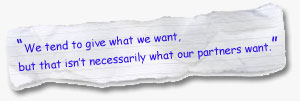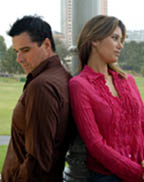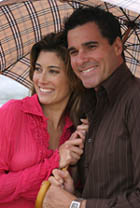Chemistry in a relationship is like a performance; one is electrifying and another is boring. But no matter what, for love’s sake, you have to keep working at it to make it better.
Chances are you’re reading this because you’re in a relationship lacking in chemistry and wondering whether to stay or go. Maybe the chemistry was once there, but you no longer feel “in love.” Or it was never there and you suspect you made a big mistake. Consider this: Maybe the real issue isn’t so much the lack of chemistry but some other problem you haven’t identified.
How do you define chemistry? I think of it as a strong attraction that includes love, lust, infatuation, and a desire to be involved intimately with someone. Chemistry is emotional desire for relationship. It is outside of the realm of reason. With it, you may be attracted to someone who you know, intellectually, is not good for you. Without it, you may be with someone you respect but are not attracted to. At best, you can have both chemistry and love; at worst, you may have chemistry and misery or no chemistry and misery. Regardless your definition, chemistry is unconscious; we don’t “choose” who we’re attracted to. Even so, we aren’t helpless. We can do much to understand and manage it. Following are guidelines that can help you navigate the minefields of attraction.
1. Do you have to have chemistry for a successful relationship? No, but don’t fool yourself into thinking you will learn to love someone. Yes, it’s possible; but if you aren’t attracted to her, you may come to resent your decision. Be honest with yourself; do not choose a relationship primarily because “she’s a good person.” This is a formula for disaster. On the other hand, if the attraction isn’t there, it can grow. Many times people grow to love one another as they get to know each other better.
2. Because it’s unconscious, searching for chemistry in a relationship is a hit-and-miss proposition. You can find it, but you’ll have to be patient. How will you know you’ve found it? You won’t be arguing with yourself whether or not you love him. If it’s a debate, then either the chemistry is missing or he’s a poor partner for you.
3. Once found, you’ll have to be patient again – or you may make a mistake you’ll deeply regret. Chemistry isn’t the end-all, be-all solution it may appear to be. Because it’s unconscious, feeling deeply attracted to someone can be a result of childhood issues you’re unaware of or haven’t resolved. A big red flag is when you see a problem in your partner and you tell yourself things like, “This isn’t such a big deal; I can handle this,” or “I know he has a problem, but he’s working on it,” or “He really loves me; I’m sure we’ll work it out.” Ignore these problems now and you’ll have much bigger ones to contend with later.
4. If you’ve made it past these hurdles, you have one more challenge: The test of time. I’ve been coaching and counseling couples since 2000. One of the comments I hear most often is, “We’ve been married for years, but haven’t felt ‘in love’ since the early part of our marriage.” The “high” of new love rarely lasts more than a couple years. Once over, you’ll need to replace it with something more substantial: caring, respect, forgiveness, and an ability to communicate. These things can be learned, but you’ll have to work hard at them. Some may be difficult skills for you to master. You can definitely do it; roll up your sleeves and get to work!
5. Can you recreate lost love? Yes! In order to do so you must have one essential ingredient – willingness on the part of both people involved. My experience with couples is once a person has “given up,” has decided in his heart he no longer wants the relationship, the chances of rekindling love are minimal. You don’t have to have a lot of willingness; faith the size of a “mustard seed” can be enough. Counseling to help resolve underlying problems and to motivate you can be helpful. Keep the faith!
David Cantu
Life Coach Austin, Texas
Chemistry in a Relationship – Is it Love? How Do You Define it?- Article © 2009

 There are those who give little of the much which they have
There are those who give little of the much which they have My first response reminded me of a scene in the movie, “It’s a Wonderful Life.”
My first response reminded me of a scene in the movie, “It’s a Wonderful Life.”
 Emotion is thought materialized in our physical being.
Emotion is thought materialized in our physical being.


 “What about me, what about what I want?” appear to be embedded deeply within us, even in the best of people. When we’re asked, “Will you do me a favor?” the response quite often is some variation of, “It depends on the favor, what do you want?” It’s as if we’re afraid that by saying “yes,” we may lose something or that the cost will be too much for us to bear. Maybe we fear committing to something we really may not want to do; so, “it depends,” gives us the leeway, or time, to come up with an excuse to back out – just in case.
“What about me, what about what I want?” appear to be embedded deeply within us, even in the best of people. When we’re asked, “Will you do me a favor?” the response quite often is some variation of, “It depends on the favor, what do you want?” It’s as if we’re afraid that by saying “yes,” we may lose something or that the cost will be too much for us to bear. Maybe we fear committing to something we really may not want to do; so, “it depends,” gives us the leeway, or time, to come up with an excuse to back out – just in case. I see two problems with hedging, with saying anything other than “yes.” The first appears minor; When we say “maybe,” we give the other person the message that “no” is a possibility. But, unless you’re dealing with a bully or someone out of touch with reality, the person is already aware that “no” is a possibility. Saying “maybe,” only underscores the fact. Saying “yes,” on the other hand, encourages and strengthens the relationship with that person. You are, in effect, saying: “You’re important to me and I’m confirming this by saying ‘yes’ without any need of explanation from you. Just tell me what you want.”
I see two problems with hedging, with saying anything other than “yes.” The first appears minor; When we say “maybe,” we give the other person the message that “no” is a possibility. But, unless you’re dealing with a bully or someone out of touch with reality, the person is already aware that “no” is a possibility. Saying “maybe,” only underscores the fact. Saying “yes,” on the other hand, encourages and strengthens the relationship with that person. You are, in effect, saying: “You’re important to me and I’m confirming this by saying ‘yes’ without any need of explanation from you. Just tell me what you want.” I’ll give you what you want because I have confidence in myself that I have it to give and I’m willing to give it. It truly won’t cost me. If you ask something I can’t give or choose not to give, I’ll tell you and perhaps help you in some other way.” In other words, saying “yes” empowers you and builds confidence in yourself that you’re abundant and responsible.
I’ll give you what you want because I have confidence in myself that I have it to give and I’m willing to give it. It truly won’t cost me. If you ask something I can’t give or choose not to give, I’ll tell you and perhaps help you in some other way.” In other words, saying “yes” empowers you and builds confidence in yourself that you’re abundant and responsible.
 Being direct is probably the most difficult of all these guidelines. Too often we tiptoe around an issue and
Being direct is probably the most difficult of all these guidelines. Too often we tiptoe around an issue and  Finally, sometimes it’s important to change to the listener role.
Finally, sometimes it’s important to change to the listener role. Relationships are sometimes a quagmire of emotion,
Relationships are sometimes a quagmire of emotion,

 Every now and then, someone writes a book, prophesies a future, or reveals a truth of nature with startling insight and pristine clarity – books such as “To Kill a Mockingbird,” the prophets Moses or Edgar Casey, the revelations of atomic theory, forgiveness, relativity, or the unity of life and the universe. In a rush to maintain our notion of reality, we frequently vilify the messenger; later, people see the truth of the message and … the world changes.
Every now and then, someone writes a book, prophesies a future, or reveals a truth of nature with startling insight and pristine clarity – books such as “To Kill a Mockingbird,” the prophets Moses or Edgar Casey, the revelations of atomic theory, forgiveness, relativity, or the unity of life and the universe. In a rush to maintain our notion of reality, we frequently vilify the messenger; later, people see the truth of the message and … the world changes. Isn’t that what humanity has been experiencing for millions of years? We will continually face war, pestilence, and destruction on the one hand, and, on the other, the possibility of peace and transformation. That’s not news; it’s reality; and it’s not going to stop happening – ever! It’s change and evolution. We make a mess of life and then make it worse, or we learn and then make it better. Life happens and we screw up, or not; and then it happens again; each time we’re on the threshold of heroism, villainy, or cowardice. We have choices to make.
Isn’t that what humanity has been experiencing for millions of years? We will continually face war, pestilence, and destruction on the one hand, and, on the other, the possibility of peace and transformation. That’s not news; it’s reality; and it’s not going to stop happening – ever! It’s change and evolution. We make a mess of life and then make it worse, or we learn and then make it better. Life happens and we screw up, or not; and then it happens again; each time we’re on the threshold of heroism, villainy, or cowardice. We have choices to make. In “War of Art,” Steven Pressfield presents us with “a rogue’s gallery of” evils lurking within each of our minds to sabotage our every attempt to take life by storm the moment we take a single step in that direction. His word for these evils is “resistance.” The endless list includes resistance of addiction, procrastination, drama, and self-doubt. The truth is you can overcome them; but to do so you must be the warrior – vigilant, diligent, and bold. Then, and only then, do you taste the sweet nectar of the life of the hero. You will make dozens of choices today. Each one will serve either your passion, the life you were meant to live, or fear.
In “War of Art,” Steven Pressfield presents us with “a rogue’s gallery of” evils lurking within each of our minds to sabotage our every attempt to take life by storm the moment we take a single step in that direction. His word for these evils is “resistance.” The endless list includes resistance of addiction, procrastination, drama, and self-doubt. The truth is you can overcome them; but to do so you must be the warrior – vigilant, diligent, and bold. Then, and only then, do you taste the sweet nectar of the life of the hero. You will make dozens of choices today. Each one will serve either your passion, the life you were meant to live, or fear.
 The first element of communication, speaking,
The first element of communication, speaking, Become a listening artist.
Become a listening artist. Create listening music.
Create listening music.